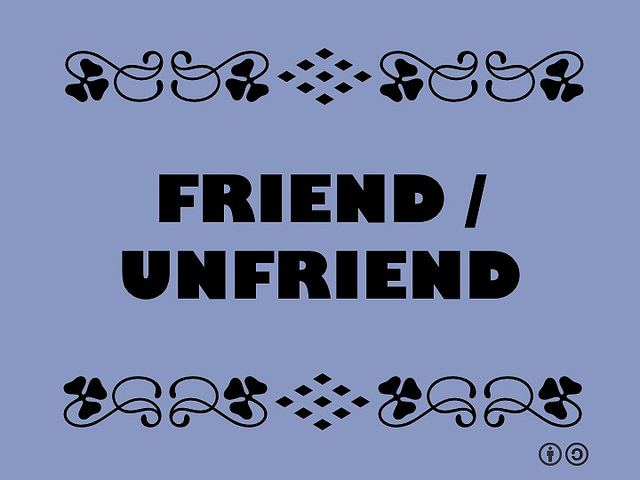
The ethics of unfriending
I have a friend who posts a lot on Facebook. That doesn’t bother me (although apparently it’s one of the top reasons why people find themselves “unfriended” online). She, however, in turn, has a friend who comments on almost all of her posts—and that other person’s comments are horrible. They are generally related to political issues; they are factually wrong, usually off-topic, and both inane and insulting. Being exposed to them makes me weary of opening my own Facebook Newsfeed.
In these days of charged political discussions, of primaries and debates, lots of social media users are finding themselves “unfriending” people with whose posts they disagree. Some commentators bemoan this. As far back as last December (when the discussion about the presidential election had yet to include the matter of genital size, and no rallies had yet been cancelled due to the presence of protesters), the Washington Post, for example, ran an article titled “Unfriending Trump Supporters Is Just Another Example of How We Isolate Ourselves Online.”
The article highlights the polarization of the public, especially among users of social media—and the dangers of living in “filter bubbles.” It also quotes a political philosopher, Mark Kingwell, who argues that one thing that’s “basic to the fundamental liberal aspiration [is] to put yourself in the position of the other. … If we don’t do that, we’re not a community. We’re a bunch of micro-communities, and … that’s quite dystopian.” He adds, “You have to be willing to read the comments section. You have to be willing to make yourself uncomfortable. … You can’t possibly realize how limited your bubble is from inside it.”
Thinking about my recent reaction to the Facebook friend-of-a-friend’s comments, I posted a link to that article on Twitter, asking, “Should we ever ‘unfriend’ someone for political views?” One reply put it succinctly: “There are limits.”
I am mindful of the danger of filter bubbles—but I am also mindful of the effect of social media on the “spiral of silence.” In 2014, the Pew Research Trust released a study about that phenomenon, which they defined as the “tendency of people not to speak up about policy issues in public—or among their family, friends, and work colleagues—when they believe their own point of view is not widely shared.” The study suggested that “a spiral of silence might spill over from online contexts to in-person contexts.” To be fair, the authors of the study cautioned that their data “cannot definitively demonstrate this causation.” They added that their findings “also might mean that the broad awareness social media users have of their networks might make them more hesitant to speak up because they are especially tuned into the opinions of those around them.” In any case, they found that “Facebook and Twitter users were also less likely to share their opinions in many face-to-face settings.”
So, how do we make sure that we hear other people’s opinions even when we passionately disagree with them, or put ourselves “in the position of the other,” as the philosopher suggested, without starting to twirl down the spiral of silence? I myself am no shrinking violet, and I don’t usually shy away from arguments (any law school classmates reading this are now laughing; OK—I’m more likely to relish than to dread an argument). I worry that we’re getting too reluctant to engage; that we’ll fall out of practice, and forget how to deal with conflict and disagreements. I’ve made it a point, since reading the Pew results, to stick with conversations that make me uncomfortable, and try to learn from them. But during the last few days, as I’ve dreaded seeing a particular name in my notifications, I think I’ve learned that yes, even for me, there are limits.
When the comments of your interlocutors leave the realm of reality, when they turn to personal attacks, when they change the subject rather than engaging with responses to prior points, what’s taking place is not a conversation. It’s OK, and perhaps necessary, to block some people precisely in order to allow a conversation to continue.
So no, I won’t unfriend or block people simply on the basis of whom they support, or why. But I will do it based on how they actually engage in dialogue. As it turns out, the “Block” button can be my friend.
Photo by Ron Mader, used without modification under a Creative Commons license.
